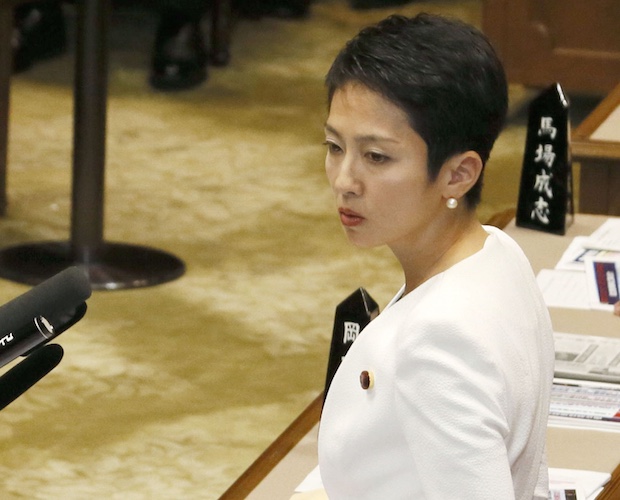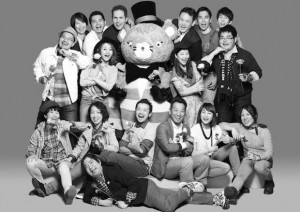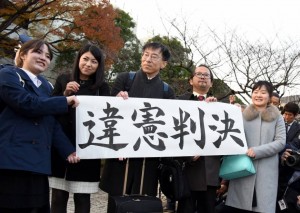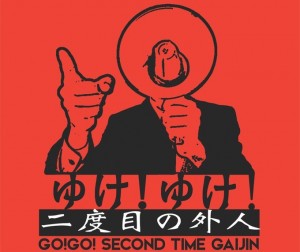The current frontrunner for the leadership of Japan’s main opposition party, the recently rebranded Democratic Party, is facing accusations of not being Japanese enough.
It is no secret that Renho was born to a Taiwanese father, making her one of the most prominent haafu (Japanese people of mixed origin) in the public eye. After a career as a glamor model among other things, she entered politics and has become something of a firebrand, known for her white suits and tough demeanor.
The DP has been faltering since it lost power in 2012, and a change of leadership to a strong woman might just be the thing to reinvigorate its future.
However, Renho — who prefers to go just by her first name rather than her full name, Renho Murata — has been accused of not being “Japanese” enough. Some of the noise is being drummed up by the far-right sections of the Internet but her case has raised an intriguing conundrum for someone so much in the limelight. Born and bred in Japan, Renho surrendered her Taiwanese nationality when she was in high school. She did this in 1985 with help from her parents, since she was technically a minor at the time. Until then, the law only allowed haafu to claim Japanese citizenship if their father was Japanese. In Renho’s case, her mother is Japanese. The law changed and she immediately wanted to cement her Japanese identity. However, it is now unclear if the Taiwanese administration side was successfully completed due to a bureaucratic snafu. In other words, regardless of her wishes, Taiwan may still have her on record as a citizen.
This would be a non-issue, except for the fact that certain unpleasant sections of the electorate do not like Chinese or Taiwanese people, and that Japan does not permit adults to have dual nationality.

Born Hsieh Lien-fang in Tokyo, Renho has expressed pride at her Taiwanese background and can speak Mandarin, but has also made it clear that she considers herself Japanese.
Her unusual situation, which is surely unlikely to upset her leadership chances, comes at an interesting time as Tokyo prepares for the 2020 Olympics while the new governor has promised not to allow a new Korean school to be built in Shinjuku.
Table tennis star and Olympic medallist Ai Fukuhara recently married Chiang Hung-chieh, a Taiwanese tennis player. Some Japanese media outlets led their coverage of the news with headlines clarifying that Fukuhara would not be changing her nationality, as if that it is even relevant.
Moreover, for the second year running, a haafu has been crowned Miss Japan in the Japan round of the Miss Universe beauty pageant. Sari Nakazawa is half Indian, half Japanese. Last year, the winner was Ariana Miyamoto, whose father is African-American.
Japanese society has something of a problem with being bicultural. While haafu are feted in fashion and on television, with the ranks of entertainers filled by many people of partly non-Japanese origin, this is purely limited to the surface.
Legally speaking, you cannot be bicultural: a Japanese citizen is not allowed to have two passports. If you are born to parents with different nationalities, you are required to chose a nationality when you reach the age of 22. (In reality, many people with two passports, including Japanese people born overseas, keep quiet and retain both.)
There seems little logic to this. Certainly, Europeans and people elsewhere are very accustomed to having more than one passport due to the origins of a parent or another incidental reason.
Even the word haafu — from the English word “half” — implies a dilemma of identity: something is missing, not whole. While the word is generally not seen as discriminatory, a better substitute would perhaps be “double” or “dual”.
Another little-discussed side to this issue is that, though television and fashion might led us to believe otherwise, the majority of haafu in Japan are born to parents who are Asian. While the slightly exotic looks of someone who is half Caucasian and Japanese might make an appealing image for the cameras, the reality of the haafu population in Japan is far less glamorous — and even unsavory to certain elements of society, where prejudice or suspicion of Japan’s East Asian neighbors lingers. (This is a situation that is not helped by continuing tensions over territorial disputes.) We wonder if Renho would be facing the same kind of censure and fuss over her red tape predicament if her non-Japanese “half” was European rather than Taiwanese.
























